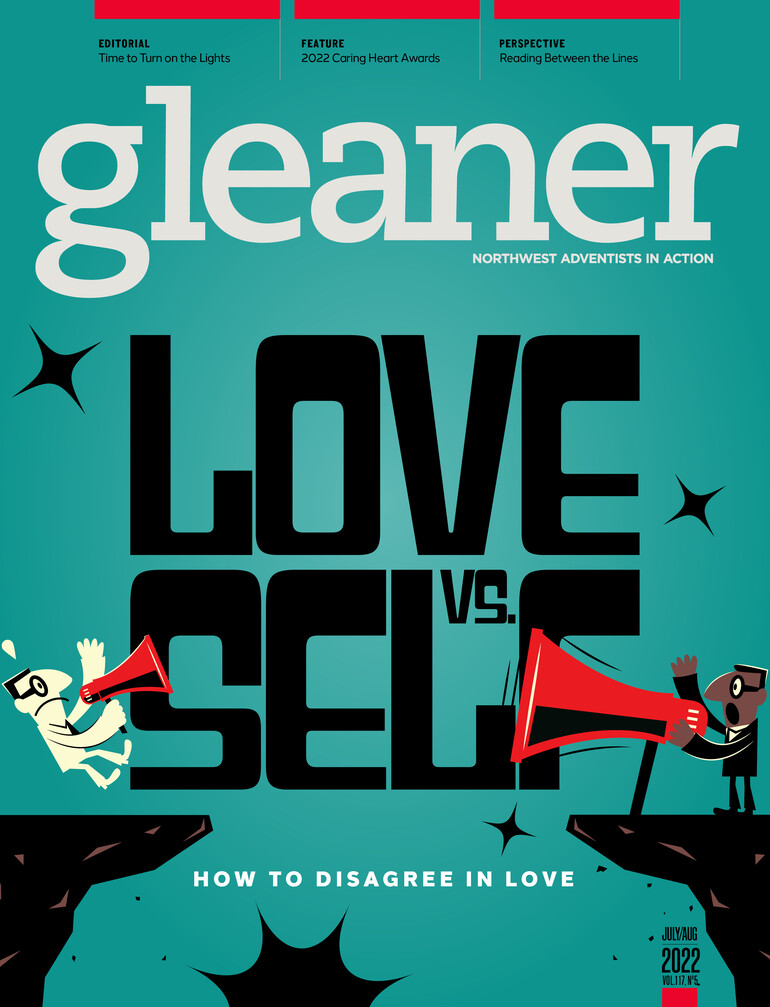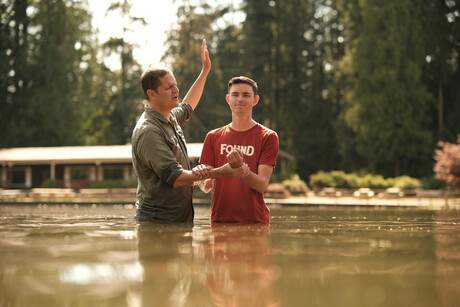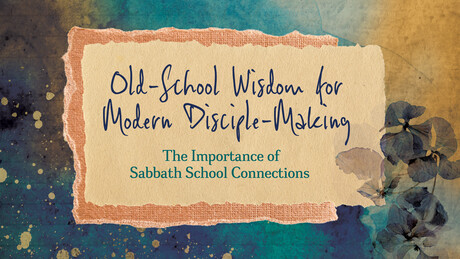Jesus saw the world differently than a lot of people. He argued with the Pharisees about how to keep the Sabbath1, called out their hypocrisy on a regular basis2 and spent time with people with whom it wasn’t socially acceptable to associate3. He even regularly took quite a different approach than His own disciples — pretty much any time He tried to teach them something. And, of course, we all know what happened when Jesus discovered the temple being used as a market4.
So if we are to follow Christ’s example, what does that mean when it comes to disagreements?
The key to understanding and emulating Christ’s example is noting the motivation behind His contrary behavior and beliefs. His actions didn’t come from a place of pride, greed, cruelty or control; they had roots in His deep love for all of humanity and His desire to see them accept the grace and love of God the Father. And, generally speaking, Jesus was a peaceful protester, but He also knew how to read the room.
Ellen White used the phrase "cruel kindness" (Christian Education, p. 10), says Alden Thompson, professor of biblical studies at Walla Walla University. "There are times when we think that if we’re going to disagree in love we have to be flexible and kind, but at some point, if you don’t have enough muscle in it, you’re not being helpful and may in fact be enabling further harm."
Sometimes that “muscle” is simply having courage enough to confront someone for whom you care deeply.
“Love is not always dressed in ‘nice,’” said Carolann De León, North Pacific Union Hispanic, family ministries and ministerial associate director. “Nice can actually be unloving because ‘nice’ and ‘kind’ are not the same thing. The person being confronted may not see it as nice, but it is a loving action from those who care. The real issue is motivation. Is it love, or is it self?”
A Willingness to Question
Katelyn Weakley, Mount Tabor Church pastor in Portland, met Steven* while sitting in a cafe a few years ago.
“He was reading at the table next to me, and the title of the book caught my attention,” Weakley said. “I told him it sounded like an interesting read, and we spent the next two hours talking.”
Over the next several months, Weakley and her husband met Steven — who identifies as a "post-anarchist, anti-feminist tribalist” — many times for conversation on a variety of topics. Though Weakley and her husband don’t necessarily identify with the same markers Steven does, “the dialogue is fantastic,” Weakley said.
“It’s because we all value relationships over being right,” she added. “Like my husband and I, Steven has a willingness and excitement to question, and coming into the conversation with curiosity rather than defense makes disagreeing in love a lot easier.”
The Weakleys and Steven consider each other friends, despite their differences, which is why Weakley felt comfortable confronting Steven about some destructive behaviors he was engaging in.
“Because I love him, I absolutely wanted to bring this up with him,” she said, “but I only felt comfortable broaching the subject because we have established a positive relationship, and together we can recognize that what I say comes from a place of love.”
"It's Not About Rightness"
In her book The Ministry of Healing, Ellen White wrote: “Every association of life calls for the exercise of self-control, forbearance and sympathy. We differ so widely in disposition, habits, education, that our ways of looking at things vary. ... Our understanding of truth, our ideas in regard to the conduct of life, are not in all respects the same. There are no two whose experience is alike in every particular. ... Each [person] should be careful in the estimate [they place] upon another” (p. 483).
Diversity and disagreement are a guarantee in most parts of our lives, but that doesn’t have to mean conflict and contempt. It starts with removing assumptions from the situation and approaching interactions with curiosity — a willingness to listen and humility.
“If we think, ‘It’s my way or the highway,’ we won’t make any progress whatsoever,” said Thompson. “If we are to disagree in love, we must make it clear they don’t have to see it our way, but we do need to allow each other’s views to be on the table at the same time. It’s not about rightness; it’s about relationship.”
This is the very definition of love, as outlined in what we know as “The Love Chapter” of the Bible, 1 Cor. 13: “Love is patient and kind; love does not envy or boast; it is not arrogant or rude. It does not insist on its own way; it is not irritable or resentful” (Cor. 13:4–5, emphasis added).
While not all interactions and associations are completely within our control — like: work colleagues, fellow church members, the people you run into at the DMV, classmates, extended family — developing and maintaining relationships are completely by choice. And that choice is simple, though not always easy: to love or not to love.
“On an everyday personal level, we experience this regularly,” said De León. “People share their own perspectives, and we are faced with a choice: Do we cut them off or ignore them? Or do we choose to remain in a loving relationship with people we know we disagree with fundamentally?”
Switching Glasses
To successfully navigate these waters, we have to be willing to consider that the window through which we see the world does not offer the same view as the window through which others see it. We may also need to reevaluate the window through which we see ourselves.
“In love, there is a lot of room for humility,” said George Knight, Adventist historian, author and educator. “When we take ourselves too seriously, there is no room for growth or discovering and acknowledging that we don’t in fact have it all right every time. Disagreeing is an educational experience.”
Love is, in fact, the litmus test for Christians, as De León pointed out. One of the key elements of discipleship is how we deal with those who don’t share our views. It doesn’t mean we have to concede right-of-way in every discussion, but it does mean taking a step back from our pride and allowing something more positive to fill that space.
In his book Beyond Common Ground, Thompson uses the analogy of a woman who visited her optometrist. As she peered into the instruments, the doctor asked her questions and made adjustments accordingly: “Is it clearer this way, with John, or this way, with Paul? What does a touch of Matthew do? Help or hinder? How about a little bit of Proverbs? Better or worse? Lamentations? Too much Lamentations? Philippians? How about a psalm? Does that help?” (p. 254).
When he concluded his exam, the optometrist was able to prescribe a set of lenses that fit the woman’s needs perfectly. The analogy continues: “Sometimes they would switch glasses—not in order to see more clearly, but to remind each other that their eyes really were quite different. Then they would both be grateful for their own. And with very different glasses they would gaze together at the distant mountains, rejoicing that they could both see them so clearly” (p. 254).
“Disagreeing in love doesn’t mean abandoning my own beliefs and thoughts,” Weakley stated. “It means I’m positioning myself in such a way that I can more humbly engage with someone. If I’m never in disagreement with anyone, I’m never giving myself opportunities to learn and grow. I need to be in those positions. We all do. To disagree in love is to allow space for discovering truth.”
Different By Design
In the first chapter of 1 Corinthians we read Paul’s words to the people of the church of Corinth, whom he had heard were divided. They were choosing sides behind their favorite preachers: Apollos, Paul, Cephas or Christ. “Is Christ divided?” Paul writes (1 Cor. 1:13). He implores them to “be united in the same mind and the same judgment” (1 Cor. 1:10).
But what does it mean to “be united?”
“Unity is not uniformity,” Knight stated. “If you want uniformity, you’re probably going to destroy whatever of value you have. That’s an autocracy, and that never works in any relationship. If you want to be unified in principle, that’s a whole other thing. True unity is letting people be themselves within the framework of authority and mutual understanding of the fact that we’re individuals. We’re not clones.”
This individuality seems to be intentional. While humanity could have been designed uniformly, we were in fact given unique skills, abilities, interests, feelings and desires. We are different by design.
“Diversity is not an accident; it was created by God,” De León said. “Encountering people who are different from us challenges us to be respectful and makes us better people when we learn to honor diversity instead of repelling it. It’s God’s way of transforming us into agents of love and respect.”
It’s also the only way to have a functional organism. Life itself rejects uniformity; every leaf on a tree, every snowflake, the pattern on every cheetah, the shading of each feather on every bird — each is unique, even if they serve the same purpose as another.
If we are to truly be the body of Christ (1 Cor. 12:12–27), we must become comfortable with differences and disagreements, knowing that despite our lack of uniformity, we are united as an effective instrument in the hands of a loving and gracious God. Whether this means flexing our muscles of loving confrontation or simply learning to listen without assumption or anger, we must honor and value diversity — not just in ethnicity or culture, but also in thought.
Ellen White points out "the Creator of all ideas may impress different minds with the same thought, but each may express it in a different way, yet without contradiction. The fact that this difference exists should not perplex or confuse us. It is seldom that two persons will view and express truth in the very same way. Each dwells on particular points which [their] constitution and education have fitted [them] to appreciate” (15 Letters and Manuscripts, Letter 53).
The True Mark of a Christian
Once we have acknowledged and accepted the value of diversity of thought, what is our response to be when we find ourselves at odds with someone on an issue about which we both feel passionately? How can we acknowledge their different perspectives and not sacrifice our own? What does a loving disagreement look like?
For De León, it starts with prayer. “If I know a conversation is going to be heated, I ask if we can pray before we begin,” she explained. “I invite the Spirit into the conversation and ask for ears to hear each other and the ability to empathize with each other’s differentness.”
It also helps to keep in mind that everyone has a reason they think and believe how they do, Weakley asserted. Just because their thoughts and beliefs don’t match our own doesn’t make the other person wrong, and if we aren’t taking ourselves too seriously, as Knight suggests we ought not, there is plenty of room for listening and understanding. Plenty of room for love.
“We all bring our background and experiences into our opinions and beliefs,” Weakley added. “Implementing the golden rule is crucial here — to do unto others as you would have them do unto you. I don’t want to be convinced I’m wrong, and I don’t want to be treated like I’m stupid for holding a particular idea. The person I disagree with doesn’t want those things either, which is why a loving approach is so integral for profitable disagreements.”
The reality is that, much like parents and teachers learn that every child requires a different disciplinary style, disagreeing in love will look different in nearly every scenario. There is no step-by-step instruction manual, no formula to follow to get the same results every time, because love looks different to everyone. Seeing the situation and relationship through the other person’s eyes can guide our response and help us determine what a loving disagreement would look like in a given situation.
“Life has been likened to a stream in which you never have exactly the same situation twice,” Knight said. “Every one of us is changed by every interaction we have with someone else. So my wife and I, for example, can argue on the same topic several months apart, but it’s not exactly the same dynamic. We should have learned something in the meantime and should be able to handle the disagreement better, or at least differently, than we did the first time.”
However, as Knight also points out, not everyone is equally flexible in their ability to shift gears or adopt new perspectives. And not everyone involved in a disagreeable conversation is prepared or able to do so in love. So, regardless of how lovingly we enter into a disagreement, there is never a guarantee that the response will be positive or the result desirable. The only reasonable approach, therefore, is to follow the example of Christ and do it in love anyway. For love is the true mark of a Christian.
White wrote, “It is not earthly rank, nor birth, nor nationality, nor religious privilege, which proves that we are members of the family of God; it is love, a love that embraces all humanity” (Thoughts from the Mount of Blessings, p. 75).
“Anywhere we go we’ll be in a diverse group of people with diverse opinions and perspectives, and that is God-ordained,” De León said. “We will celebrate eternity with a diverse group of people, and we will all have one thing in common: Love.”
*name has been changed
1 (Matt. 12:1–14, Mark 2:23–28)
2 (Matt. 23:1–39, Luke 11:37–52)
3 (Luke 8:43–48, Matt. 8:1–3, John 4:4–42)
4 (John 2:13–16)









